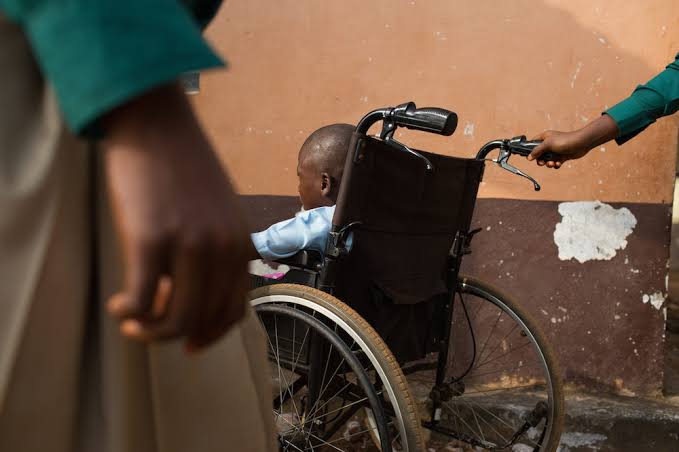Arriving at a health centre but not being able to physically access it. Needing information about your health but not being able to read it. Asking your doctor for family-planning advice but having to have the advice translated into sign language by a third party, resulting in a lack of confidentiality and privacy. These are only a few of the challenges faced by the 1 billion people who live with disabilities worldwide when trying to access health-care services. However, people with disabilities have the same right to health as everyone else.
Disability prevalence is rising, owing to ageing populations and the increase in chronic health conditions, among other factors. Through long-term access to antiretroviral therapy, living longer with chronic HIV is increasingly possible, but may occur alongside other co-morbidities and the risk of disability.
People with disabilities are at a heightened vulnerability of poverty, legal and economic inequalities, gender-based violence, sexual exploitation and abuse, exclusion from health care and human rights violations, all of which increase their risk of contracting HIV. In western Africa, women and girls with disabilities may fall victims to harmful myths such as virgin rape—the belief that having sex with a virgin with a disability will cure HIV—and other sexual violence supposed to bring wealth or power to its perpetrator.
Young people with disabilities are also at greater risk. Because of the expectation that they are not sexually active, young people with disabilities are often omitted in discussions about comprehensive sexuality education and excluded from sexual and reproductive health services.
It is within this context that the Governments of Norway and Ghana and the International Disability Alliance (IDA) will be holding the second Global Disability Summit on 16 and 17 February in Accra, Ghana. The first Global Disability Youth Summit will also take place on 14 February, co-hosted by IDA, the United Nations Children’s Fund and Atlas Alliance.
“Since the last Global Disability Summit, as a result of the COVID-19 pandemic the situation of the most vulnerable groups of society has deteriorated —and in particular, people with disabilities have suffered heightened violence, exclusion and disarray. Our mission is to turn words into actions to realize the rights of persons with disabilities everywhere,” said Anne Beathe Tvinnereim, Minister of International Development, Norway.
Data from sub-Saharan Africa suggest that there is an increased risk of HIV infection of 1.48 times among men and 2.2 times among women with disabilities compared to those without disabilities. In western Africa, several studies have shown that HIV prevalence among people with disabilities was on average two to three times higher than among the general population.
“Young people with disabilities, estimated to be 200 million around the world, want tailored health care, inclusive education, access to employment, and better access to new technologies. They are agents of change of their own future—and we stand ready to hear them and support them,” said Hon Kwaku Agyeman-Manu, Minister of Health of the Republic of Ghana.
The COVID-19 pandemic has made the situation worse. Because of interrupted health services and lockdowns, women with disabilities in particular are suffering acute financial pressure—many are raising children on their own and hence are even more likely to experience sexual violence.
UNAIDS has long advocated for a three-track approach to advance the inclusion of people with disabilities in HIV responses:
- Disability-specific activities and mainstreaming disability across all aspects of HIV responses.
- The authentic participation and active involvement of people with disabilities in all elements of programmes.
- Disability-inclusive policies, programmes and implementation strategies that ensure appropriate funding and resources.
Specifically, UNAIDS is advocating for five actions:
- More research and better disaggregated data—the world needs to know and understand the health needs of all people with disabilities at a more granular level.
- Adequate funding to be allocated to mainstreaming disability across systems for health and disability-sensitive HIV services. Services need to be accessible to all and respond to the specific vulnerabilities and needs of people with disabilities.
- The international community must commit to the meaningful inclusion of people with disabilities and their representatives at all levels of policies and programmes, from design to planning, implementation, monitoring and evaluation. It must also invest in strengthening the capacities of community-based organizations led by people with disabilities and delivering services to people with disabilities.
- Policymakers and health providers must guarantee rights-based, people-centred, non-discriminatory health services. Traditional or cultural stigma needs to be rectified by appropriate training and the sensitization of health-care staff around disability.
- Global leaders must address the intersecting structural determinants, such as poverty, exclusion and gender-based violence, that further aggravate the vulnerability of people with disabilities. Only interventions that end entrenched inequalities and establish more supportive environments can improve the overall health of people with disabilities and give them a chance of a life lived in dignity.
Ending AIDS without including people with disabilities is impossible.
“I hope, along with the summit’s organizers, that governments, policymakers and organizations around the world will commit to change and come together to create a more inclusive society,” said Angela Trenton-Mbonde, UNAIDS Country Director for Ghana.


